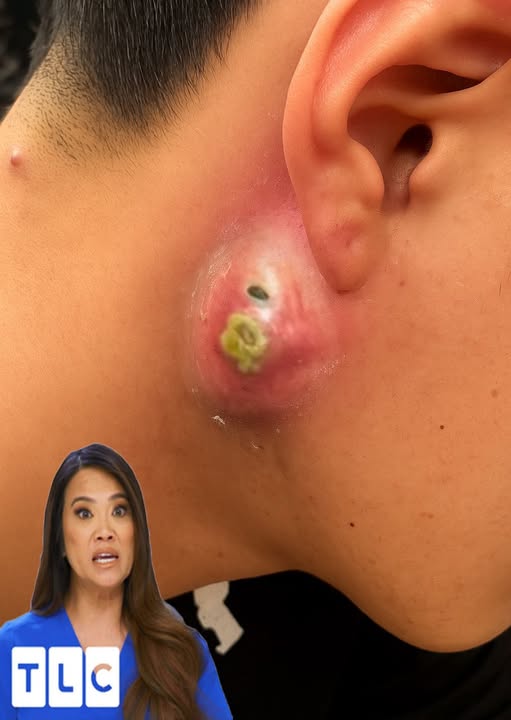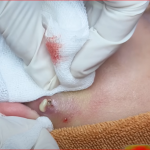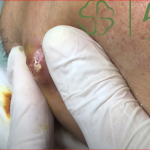Several factors can cause acne, including your hormones. Hormonal acne is most common during puberty but can occur at any age, including menopause. It happens when hormonal changes increase the amount of sebum (oil) your skin produces, clogging your pores and resulting in acne.
Here we discuss what hormonal acne is, its causes, and the most appropriate treatments.
Understanding hormonal acne
Hormonal acne is usually associated with puberty, but it can affect adults at any age because of hormonal changes or imbalances. In adults, it’s sometimes known as ‘adult acne’.
Hormonal acne can affect both men and women, but women are more likely to be affected. It can also occur during pregnancy and menopause.
The severity of acne can be categorised in 3 ways:
- Mild – mostly whiteheads and blackheads, with a few raised bumps (papules) and small pus-filled bumps (pustules).
- Moderate – more widespread whiteheads and blackheads, with lots more papules and pustules.
- Severe – lots of large papules, pustules, nodules, and cysts that can be painful and may cause scarring.
Often, mild acne can be treated by a pharmacist with over-the-counter treatments, but for moderate or severe acne, you may need prescription medications from a doctor.
What are the symptoms of hormonal acne?
Hormonal acne lesions are most likely to appear on your face and cheeks, but they can also appear on your:
- neck
- back
- shoulders
- chest
There are several types of hormonal acne lesions or spots, including:
- whiteheads – also called closed comedones and appear white on top
- blackheads – open comedones appear black after sebum reacts with air
- papules – small, raised, red bumps caused by an infected hair follicle that are usually 2 to 5mm in diameter
- pustules – small, red, pus-filled pimples that measure 2 to 5mm in diameter
- nodules – larger, deeper, hard pimples that can be painful
- cysts – large lumps under the skin that contain pus and can be tender and painful

How does hormonal acne differ from other types of acne?
Hormonal acne is different to other types of acne because it is caused by hormonal changes rather than bacterial overgrowth, which is more common with other acne types.
How do I know if I have hormonal acne?
Hormonal acne can be caused by events or conditions where your hormone levels change, such as:
- menstrual cycle
- pregnancy
- menopause
- polycystic ovary syndrome (PCOS)
One of the major signs that you have hormonal acne is recurrent breakouts that appear:
- at the same time each month
- before, during, or after your period
- in the same area
What can make hormonal acne worse?
Several factors can make hormonal acne worse. These include:
High humidity or pollution
Living in an area where there is high humidity or pollution can make acne worse as these environmental factors can irritate the skin.
Family history
Acne can run in families. An early study found that adult acne is more likely to affect people who had a relative with acne. Conditions such as PCOS can also be hereditary and acne can be a symptom.
Medical conditions
Medical conditions such as PCOS can make acne worse because of the hormonal changes or imbalances taking place in the body. For example, PCOS increases the production of male hormones, like testosterone, which stimulates skin cells to produce more oil, leading to clogged pores, and breakouts.
Medication side effects
Some medications can cause acne as a side effect, including:
- corticosteroids
- lithium
- testosterone
- some antibiotics
- certain antiepileptics
If you experience acne, you should speak to your doctor before taking these medications. They will be able to provide advice about how you can prevent or treat acne outbreaks or find a suitable alternative that doesn’t cause acne.
Other hormonal changes
Certain conditions and life stages can contribute to acne, especially if they cause a change in hormone levels, such as:
- pregnancy
- menopause
- stress
What causes hormonal acne?
Hormonal acne is caused by changes in hormone levels that result in an increased production of sebum in the skin. Sebum is a natural, waxy oil that is produced by glands in the skin to keep your skin and hair moisturised and protected.
However, too much sebum can clog pores and trap bacteria, resulting in inflammation and acne.
The hormones involved in hormonal acne include:
- androgens or male hormones like testosterone – at high levels, they can cause an overproduction of sebum
- progesterone – an increase in progesterone during the menstrual cycle is often blamed for sebum production fluctuations and breakouts
- oestrogen – can reduce the size of sebaceous glands, reducing sebum production so it may have a protective role against hormonal acne outbreaks
- insulin – at high levels can increase the production of sebum which may contribute to breakouts
Several factors can contribute to hormone imbalances and acne, including:
Puberty
The hormonal changes that take place in puberty increase the production of certain body products, like the natural oils that are produced in the skin. This increases the risk of skin pores or hair follicles becoming blocked and inflamed.
The menstrual cycle
The menstrual cycle causes major fluctuations in the hormones leading to overproduction of oils by the skin glands. This can lead to blocked pores and flare-ups.
PCOS
Polycystic ovary syndrome can have a great impact on your hormones meaning this can increase your risk of developing hormonal acne. This is due to overstimulation of the oil-producing sebaceous glands due to high levels of androgens like testosterone.
Menopause
The menopause causes an underproduction of different hormones, mainly oestrogen and progesterone. All of which can lead to overstimulation of the sebaceous glands and overproduction of the body’s natural oils.
Stress
When you are stressed your body releases hormones like cortisol and androgens which can increase sebum production. These hormones
could lead to flare-ups of hormonal acne, however, you are more at risk if you are prone to acne flare-ups.
Diet
Certain foods may put you more at risk of poor health, causing skin and health changes. Eating a balanced healthy diet rich in fruit and vegetables, lean fats and proteins will help deliver the essential nutrients needed to keep the body’s systems working in good order. You can reduce your risk of flare-ups by cutting back on sugary foods, high-fat products, processed food, and dairy.
Drinking plenty of water or fluids keeps your skin hydrated which helps with your overall skin health.
Can pregnancy cause hormonal acne?
Yes, pregnancy can cause hormonal acne as the changes that take place in the hormones can trigger an increase in activity of the glands, boosting the production of the skin’s natural oils. This can lead to acne flare-ups.
How to treat hormonal acne
Hormonal acne can be managed with a combination of over-the-counter and prescription medications and lifestyle changes. Treating hormonal acne will help to reduce the severity of acne outbreaks and prevent complications, like acne scarring.
Topical treatments
Topical treatments are applied directly to the affected area and work in several ways to reduce the appearance of lesions. Both over-the-counter and prescription topical treatments are available.
If your hormonal acne is mild, an over-the-counter topical treatment may be effective at reducing the appearance of breakouts. Over-the-counter options include:
- salicylic acid cleansers – exfoliates skin to unclog pores
- benzoyl peroxide – kills acne, causing bacteria and absorbs excess oil, examples include Acnecide
- topical retinol – derived from vitamin A, retinol creams slow down cell overgrowth and reduces inflammation
For more moderate or severe types of acne, you may need stronger topical prescription medications.
Topical retinoids can help to treat more moderate forms of hormonal acne. Tretinoin and adapalene are often used to treat acne. They are available in gel or a cream, and you’ll usually need to apply them once a day before you go to bed. Topical retinoids work by increasing follicle cell turnover, increasing the removal of dead skin cells and comedones, preventing further acne lesions from developing.
Adapalene is available under the brand names Differin gel or Differin cream. This topical retinoid can reduce the number of non-inflammatory acne lesions by 46%.
Azelaic acid is another prescription-only topical treatment that may be useful for treating hormonal acne. It works by reducing keratin production, exfoliating the skin, and preventing new comedones forming. Because of its anti-inflammatory and antibacterial properties, it can be an effective choice for hormonal acne. Studies have shown it can lower the number of comedones by around 26%. At Superdrug Online Doctor, we can provide the following azelaic acid preparations:
- Finacea gel
- Skinoren cream
Oral medications
Sometimes hormonal acne doesn’t respond to topical treatments, so oral medications may be an alternative option.
Combined oral contraceptives
Combined oral contraceptives like the combined pill containing oestrogen and progesterone can be an effective way to manage hormonal acne in women. They do this by regulating hormone levels and reducing the production of androgens.
Studies show that the most effective combinations include ethinylestradiol with one of the following:
- levonorgestrel
- norethisterone
- norgestimate
- drospirenone
- cyproterone acetate
- chlormadinone acetate
- dienogest
- desogestrel
Some of the pills that can work for hormonal acne include:
- Yasmin
- Lucette
- Rigevidon
- Microgynon
At Superdrug Online Doctor we only prescribe the combined oral contraceptive pill as a method of contraception and not for solely managing acne. You can speak to your GP if you want to try the pill for acne, or if you’re already taking the pill and want to switch to another.
Anti-androgen medications
High levels of male hormones (androgens), like testosterone, can cause acne by increasing the amount of sebum produced by the sebaceous glands.
Anti-androgen medications like spironolactone are usually prescribed to women with acne who have other signs of hyperandrogenism like PCOS. Research shows that 24 weeks of treatment with spironolactone improved acne in 82% of people.
Antibiotics
For severe cases of acne, antibiotics are usually prescribed in combination with a topical treatment. Tetracyclines are the most commonly prescribed antibiotics for acne. However, it can take up to 6 weeks for you to notice an improvement in your symptoms.
At Superdrug Online Doctor, we offer the following combination antibiotic treatments:
- doxycycline + Skinoren 20% cream
- doxycycline 100mg + Epiduo gel 0.1%
- lymecycline 408mg + Skinoren 20% cream
- lymecycline 408mg capsules + Epiduo gel 0.1%
- oxytetracycline and Epiduo
Natural and lifestyle remedies
Some natural approaches and lifestyle changes can help to manage hormonal acne outbreaks, including:
Diet
Some research suggests that foods with a high glycaemic index (GI) and carbohydrate level can promote the development of acne lesions. Dairy foods also increase the prevalence of acne, especially in populations that follow a Western diet.
It can help to keep a food diary to try and identify any foods that may be triggering your acne outbreaks, so you can avoid them in future.
Stress management
Stress can promote acne severity. So, it is important to practice stress management techniques to prevent acne outbreaks from getting worse. Some of the things you can try, include:
- avoiding specific stress triggers
- practising mindfulness, meditation, and yoga
- exercising regularly
- taking up a new hobby
Follow a good skincare routine
It is important to promote skin health by following a good daily skincare routine. Things to consider include:
- gently wash your face no more than twice a day and after sweating
- use mild soaps and cleansers and warm, not hot, water for rinsing
- avoid harsh or exfoliating scrubs
- avoid scrubbing, picking, or scraping pimples as this can make them worse and lead to inflammation
- use non-comedogenic products (designed not to clog pores or cause acne, or make it worse) such as cosmetics, cleansers, and hair products
- avoid humid environments where possible as they can cause excessive sweating
How soon after treatment will hormonal acne go away?
How long it takes for hormonal acne to clear following treatment can depend on several factors, including which treatment you received and how your body responds to it.
Usually, it takes around 4 to 6 weeks to see an improvement in your skin and up to 3 months for your treatment to take full effect.
Can hormonal acne be cured permanently?
No, hormonal acne cannot be cured permanently, but there are several acne treatments available that can help you effectively treat and manage it.
Sometimes hormonal acne can go away on its own, such as once your hormones have settled down after puberty or menopause, but there’s a chance it could be triggered again in the future. Things like the contraceptive pill can also make it go away for some people while taking it, but it may come back if you stop treatment.
Preventing hormonal acne
There are several lifestyle changes you can make to prevent or reduce the severity of hormonal acne outbreaks:
- Use skincare products that are less likely to block your skin pores – look for labels that say they are ‘non-comedogenic’.
- Follow a good daily skincare regime by washing with a mild lotion and lukewarm water twice per day.
- Wear sunscreen in sunlight.
- Always remove any face makeup or heavy products before bed.
- Eat a balanced diet that includes lots of fruit and vegetables, low amounts of sugar, fats, and processed foods.
- Drink plenty of water each day.
- Practice good sleep hygiene to help you get a good night’s sleep and promote hormone balance.
- Avoid squeezing spots, blackheads, and whiteheads.
- Wash your hair regularly.
Myths about acne causes
There are many myths about the causes of acne, including that it’s the result of poor hygiene, dirt, and eating chocolate.
These are unfounded claims and acne is actually caused by a combination of genetics, hormones, and lifestyle factors. However, there is some emerging evidence that suggests that there is a positive link between dairy consumption and acne occurrence.
Summary
Hormonal acne develops because of hormone changes or imbalances. Although it can affect anyone, it’s more common in women.
Hormonal acne may not be able to be cured permanently, but there are many over-the-counter and prescription treatments available to help manage it. At Superdrug Online Doctor, we provide several acne treatments that are suitable for hormonal acne outbreaks.
If you’re not sure if your symptoms are hormonal or which treatment might be best, you can use our skin condition diagnosis service for an accurate diagnosis from our doctors by submitting some photos of the affected area.



